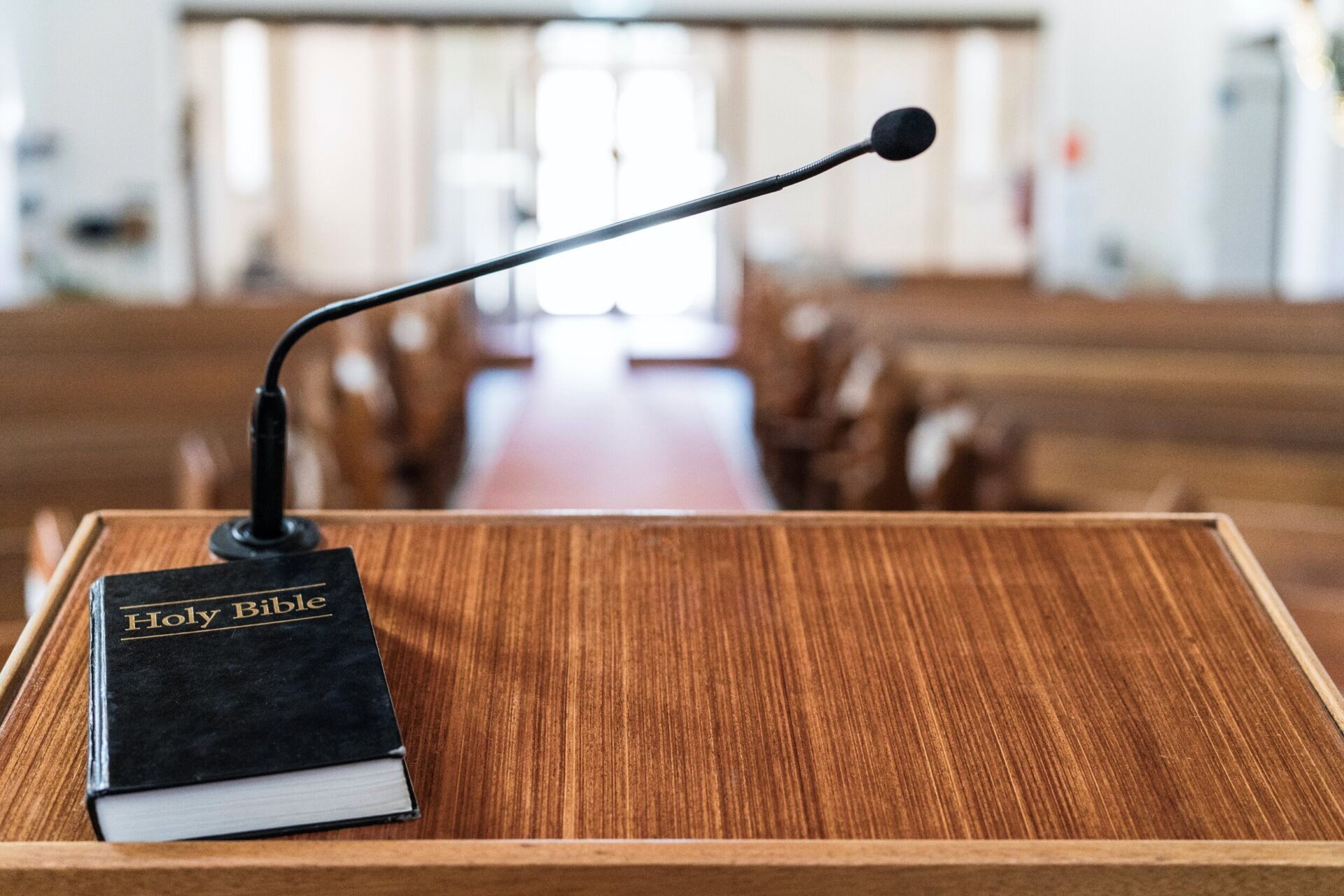
As we approach the last few weeks of the election season, the country is on edge. Forbes recently surveyed over 2,000 Americans from Sept. 4-6, 2024 and found that over 60% of respondents reported feeling, “slightly, moderately or significantly negatively impacted by the upcoming election.” 46% of respondents in the same survey reported feelings of anxiety. Clearly the election is having an impact on Americans, and many are opting out of political conversations altogether.
As the election season intensifies, church leaders are also wrestling on the best practices to address the election without endorsing particular candidates or worldviews. Some church leaders explicitly make partisan statements from the pulpit while others are more subtle. Trevon Wax, vice president of research and resource development at the North American Mission Board, describes how many younger evangelicals “believe the need of the hour is for the church to jump into the fray of hardball politics and be bolder and louder in opposing leftward trends that are harmful for society.”
As a candidate for ordained ministry, I along with parishioners, pastors and colleagues from both sides of the aisle have wrestled with the best ways to approach the election. I served in ministry in Texas for two years, and I noticed some pastors in the area explicitly state their partisan allegiances, even going as far as having church services around certain candidates or themes. Other pastors preached a more subtle message on caring for the poor and marginalized, which lacked the partisan overtones. I have also witnessed other pastors preach a social gospel from the pulpit, or sermons that were more issue-focused and less gospel-centered.
These sermons divided members of congregations, which exacerbated an us-versus-them mentality. Gospel-centered sermons focus on Jesus. The dangers of partisan sermons is that they are a response to the external cultural forces. These reactionary responses stem largely from fear of what’s to come. For some Christians, turning to political leaders provides a form of safety and security.
Many churches have largely adopted ongoing cultural conflicts. Instead of changing the culture, they have baptized the customs of the culture and brought them to church. Church members are even afraid to talk to one another about politics, which is becoming more endemic in our current society. In What Do We Do When Nobody Is Listening? Leading the Church in a Polarized Society, Robin W. Lovin reflects on the negative ways partisanship has infected churches because parishioners, which reflect society at large, don’t talk to one another. Too often in the church, we listen to respond rather than truly siting with people and listening. Pastors avoid creating more conflict in a church by not diving into the tough issues. When pastors avoid political conversations, they cede their spiritual guidance and public leadership to other louder voices within the culture for the sake of keeping the peace at church.
Pastors navigate a fine line between their duties as leaders called by God and their duties as citizens. By navigating this balance, pastors can rightly model political discipleship in their dual callings for their parishioners.
Should pastors decry or encourage public policy from the pulpit? No. Should pastors guide their congregations in determining whether a policy is just and right? Yes. Pastors navigate a fine line between their duties as leaders called by God and their duties as citizens. By navigating this balance, pastors can rightly model political discipleship in their dual callings for their parishioners. To avoid alienating certain members of their congregation, pastors ought to voice their personal views in a discrete manner. One piece of advice I received is that pastors should not yoke themselves to a particular ideology. Pastors should instead guide their parishioners to discern their views for themselves and not rely solely on the pastor as the source of all political knowledge.
Why pastors shouldn’t disclose their votes
In short, no. I do not think that pastors should endorse politicians from the pulpit. Pastors endorsing particular candidates would undermine their pastoral authority and could foster divisions within their churches. By doing so, pastors expose themselves to the slippery slope of endorsing the candidates’ policies, even if they disagree with particulars. Kimberly Reisman, the Executive Director of World Methodist Evangelism, cautions against pastors sharing who they voted for because, “God can use leaders from all parties, and to equate God’s will with the will of any political party or person is exceedingly dangerous and a threat to the overall witness of Christians in the United States.”
One misconception that Christians on both sides of the political spectrum may have is that God supports one side of an issue and not the other. However, I think Christians on both sides of the aisle miss the point when they expect a political party to neatly reflect the values of the Kingdom of God, especially when it comes to pastors expressing their views from the pulpit. These views usually manifest themselves in sermon points that mimic partisan talking points, which amplifies polarization. Some parishioners may even become suspicious of their pastor because of where they are on the political spectrum.
There is concern, rightly so, of pastors politicizing the pulpit, or that they are stumping for their respective candidate. Richard Stearns, President Emeritus of World Vision U.S., cautions against pastors stumping for any candidate for fear of impropriety, especially as the partisan lines are more demarcated.
One misconception that Christians on both sides of the political spectrum may have is that God supports one side of an issue and not the other. However, I think Christians on both sides of the aisle miss the point when they expect a political party to neatly reflect the values of the Kingdom of God, especially when it comes to pastors expressing their views from the pulpit.
He adds a more poignant answer that “committed Christians can and do disagree on political issues because there is rarely only ‘one legitimate Christian answer’ for most political questions.” Issues and their solutions are not as clean cut as the electorate likes to believe. Two examples come to mind: trade and immigration, which in fact, dovetail into one another. Both political parties offer solutions, yet those solutions are not as clean cut as the electorate would like them to be.
This latter response is where pastors, on both sides, fall into the either/or trap. They mistakenly believe there can be only one way, and with this tunnel vision, there is no opportunity for discussion.
Christine Helmer and Amy Carr, two Lutheran theologians, note that Christian groups on the right and left have called each other heretics, and by doing so, have narrowed the scope of conversation. They note, in Ordinary Faith in Polarized Times: Justification and the Pursuit of Justice that “In a context in which the Christian right has painted liberal Christians as heretics and the Christian left accuses the right of being irrational, we note the irony of both gestures: each conditions Christian identity on something other than justification by faith in Christ — in this case, on naming and living the moral law in a particular way, even amid Christian tension about it.”
For pastors, we walk this fine line between spiritual guide and public leader. In fact, pastors not only navigate this tension for themselves, but they model that for their congregations, too. Pastors, as spiritual and public leaders, ought to model the best ways of engaging the conversation by looking at how their faith shapes the world.
Pastors as models
While some may expect pastors to remove themselves completely from politics in general, or at the very least from the pulpit, by doing so, pastors ignore their prophetic role by addressing the concerns of society from a biblical perspective. Tami Heim reminds pastors that, “they are to provide that perspective on issues relevant to our time. They should challenge congregants to study Scripture and support leadership based on what they believe to be true.”
Pastors are called to shepherd their congregations, campus ministries and other parachurch organizations. Pastors lead their parishioners into discerning God’s truth, which does not come solely from the pastor alone, rather, it comes together in the community of the faithful. Even during tumultuous election cycles, pastors are called to wrestle together with their congregation. When pastors engage their congregations on important issues, the apparent aggressiveness from the pulpit diminishes. When pastors rightly model this practice, they encourage their congregation to fully engage the world around them.
Truth is often equated with facts, yet truth emerges from facts. Truth, especially God’s truth, is discerned together in community; however, the truth that emerges from our communal discernment always points to the one who is the Truth, the Way, and the Life: Jesus.
In fact, Saint Paul reminds his student Timothy of his role as a public leader, and he is called to form the hearts and minds of his flock towards Jesus.
“Have nothing to do with profane myths and old wives’ tales. Train yourself in godliness, … godliness is valuable in every way, holding promise for both the present life and the life to come.
Until I arrive, give attention to the public reading of scripture, to exhorting, to teaching. Do not neglect the gift that is in you, which was given to you through prophecy with the laying on of hands by the council of elders. Put these things into practice, devote yourself to them, so that all may see your progress. Pay close attention to yourself and to your teaching; continue in these things, for in doing this you will save both yourself and your hearers (1 Timothy 4:7-8, 13-16 NRSV).
Pastors can facilitate the questions asked by parishioners, and instead of providing certain partisan talking points, they can provide answers through a different lens — the lens of the gospel. Boiling politics down to its core should prompt pastors to ask their parishioners: what is the best way for us to care for our neighbors? It is possible for political conversations among devout Christians explore different ways of caring for their neighbor, or put another way, to what extent should the government be involved?
Boiling politics down to its core should prompt pastors to ask their parishioners: what is the best way for us to care for our neighbors?
Public Justice Approach
Pastors do not need to shy away from addressing the events happening in their community, and their parishioners do not need to avoid political conversations either. Rather, Christians — whether pastor or parishioner — ought to consider how Christ’s Lordship and the grace of God change everything, even politics. When we start with the gospel, then we see the world through a new lens.
One way for churches to faithfully engage in their local community is through the Center for Public Justice’s Political Discipleship Curriculum. This 11-week guided study invites small groups to explore the richness of public theology while also engaging in local advocacy around an issue selected by the small group.
As someone in the process of becoming ordained into the church, I have thought more about how our political selves intersect with our spiritual selves. Both selves compose the whole person, and yet, those parts cannot be separated from one another. My role as pastor is also to guide my parishioners through questions that are relevant to their lives, even and especially as it pertains to their political questions or to legal aspects of the church. One resource I have found helpful is from the Church Law and Tax Group. They created a guide on the best ways for congregations to engage with political candidates while also not losing their tax status.
As the election nears, pastors will receive lots of questions regarding the state of the country and the next leader. Ultimately, pastors should not openly endorse political candidates. Yet they still have a responsibility to remind their congregations that while the world’s problems won’t be fixed by the actions of whoever becomes president, who holds the office does matter. Rather than disengage or try to escape the world’s problems, pastors should seek to practice discernment as to how Jesus might be calling them to be better citizens of the world.
Thomas Johnston, CPJ ‘20, is a candidate for pastoral ministry within the Evangelical Lutheran Church in America and is a graduate of Trinity Lutheran Seminary at Capital University.
The views expressed in this article belong to the author and do not necessarily reflect the views of the Center for Public Justice.





